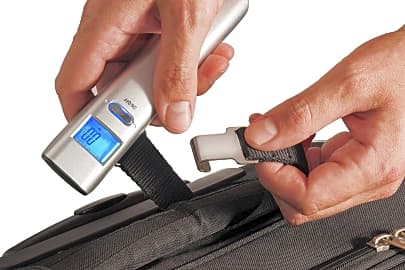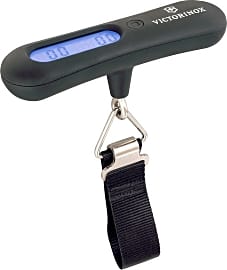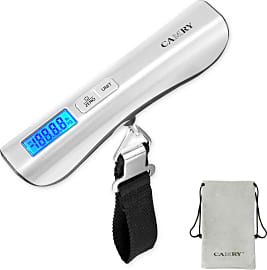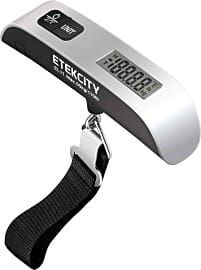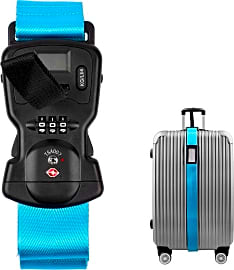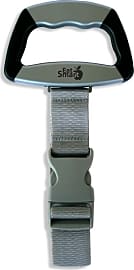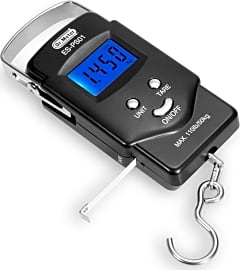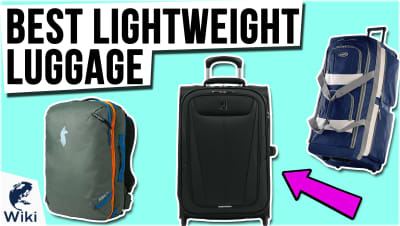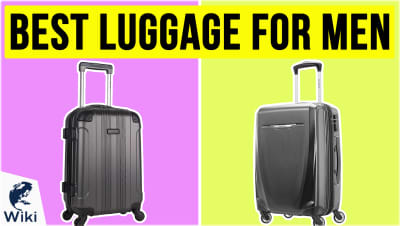The 10 Best Luggage Scales

This wiki has been updated 46 times since it was first published in March of 2015. Now that the airlines are trying to charge extra for just about everything — including plain water and using the lavatory — the last thing you need is to get caught at the airport with annoying excess baggage fees. One of these luggage scales will ensure you stay comfortably within the limits of your preferred carrier, which should help remove some of the stress from your trip. When users buy our independently chosen editorial recommendations, we may earn commissions to help fund the Wiki.
Editor's Notes
May 22, 2019:
Although it's been touted as a top option, we have decided to remove the Balanzza Mini; it has a great design and useful functionality, but ongoing issues with quality control render it unreliable for some users. But we still find the Tarriss Jetsetter Eggshell and Dunheger High Precision to be high-quality choices that will suit everyone from frequent travelers to occasional flyers. They both have a strap that you slip around the handle of your luggage, which helps keep them secure while you lift, and they're both made to be portable but reliable. We also added two new options that are just a bit different. The first, the Klau Crane, is actually a general purpose crane scale, but it works well for weighing bags. In fact, it's made to hang and weigh, so for those who can't hold up a heavy piece of luggage while the weight is locking in, it's a good choice. The second, the Smaior Belt, features a scale and lock built right into a luggage strap. It's TSA compliant, which is handy, but it currently only comes in bright colors, a choice that not all travelers will like.
The Evolution Of The Luggage Scale
Though the function of a luggage scale has stayed the same, today’s scales are a far cry from the spring-loaded scales of the past.
The technology of the first luggage scales dates back to the 1770s. Early on, luggage scales were very simple pieces of technology called spring scales. They were constructed with a round metal chamber that housed a strong metal spring. A hook was attached to this spring on one end, and a handle was attached to the scale on the other end. By hooking the scale onto your luggage and lifting up on the handle, you could get a rough estimate of how much your luggage weighed.
As you can imagine, spring scales were not extremely accurate. Variables when creating the springs themselves may mean that a 50 pound spring actually maxes out at anywhere from 45-55 pounds. In addition to that, the temperature of the scale can actually have an effect on the reading. As the spring scales are based on the force of gravity, readings can fluctuate depending on where you are in the world. That’s probably why the scale in the produce aisle says something different than the one at the checkout stand. If you need an accurate reading every time, spring scales are not your best option.
Though the function of a luggage scale has stayed the same, today’s scales are a far cry from the spring-loaded scales of the past. Most modern scales use electrical strain gauges to measure how much an object weights. Gravity and temperature have no effect on these scales, and they are limited only by their weight capacity.
Features To Look For In A Luggage Scale
Luggage scales have come a long way since their spring and chamber days. Thanks to advances in technology, most modern scales are digital. As with anything else, when you are looking to buy a luggage scale, there are additional things to consider besides just price. Accuracy in the modern era is usually not a problem, as most scales can easily weigh items in fractions of pounds. It is important to look for the scale that best fits your needs, however. If you need a scale that is extremely accurate, don’t buy one that rounds up to the nearest pound or half pound.
Oddly enough, you may want to consider the weight of the scale as well.
Something else to think about is weight conversion. If your airline lists accepted weights in kilograms and not pounds, you may want to invest in a scale which can convert units of measurement. Or, you could buy a calculator and a luggage scale…whatever works best for you.
Oddly enough, you may want to consider the weight of the scale as well. Granted, you can’t use the luggage scale to weigh itself, but when you are shopping around for a scale to use frequently or that you may take traveling with you, factor in the weight of the scale. If you are worried about fitting all those souvenirs in your bag and staying below the weight limit, adding a three pound scale to the extra weight can just be another headache.
Some scales are even backlit. Should you find yourself weighing your luggage for a flight at 4:30 a.m. while trying not to wake your roommate; they will most certainly appreciate you having purchased a backlit scale.
You'll want to avoid a luggage scale with a limited weight capacity. How much your checked baggage can weigh varies from airline to airline, but the average is about 50 pounds, so any scale that cannot weigh over that isn't a valid option. If your luggage exceeds the airlines weight restrictions, they will usually charge you a set fee per additional pound. Consider a luggage scale that can hold 80-100 pounds. This way, you can figure out how much you will need to pay if you are going to go over the restrictions, and then decide if the extra stuff is worth the price.
Other Interesting Uses For Luggage Scales
Even airport scales can be inaccurate. Having a luggage scale is a way to be sure your luggage is under weight, while also keeping those airport scales in check. Unless you travel often though, your luggage scale may find itself collecting dust if all it is used for is weighing luggage.
Unless you travel often though, your luggage scale may find itself collecting dust if all it is used for is weighing luggage.
Luckily, a good luggage scale can be used for anything you can pick up by hand. For the avid backpacker, an accurate luggage scale can be used to quickly check your pack weight, to keep you from carrying too much on the trail. A bicyclist may use the scale to weigh their bike before a race.
On a fishing trip, a luggage scale can have a double purpose, after making sure your luggage is at the proper weight, it can be used to weigh that fresh caught fish…so long as you don’t mind the smell. Luggage scales can even be used to get shipping costs on packages. Tie a rope around the item and attach it to the luggage scale. Now you have your very own shipping scale.
They can actually be used for any bulky items that are too large for your bathroom scale, as long as you can fit a rope around it or it has a hook of some kind. If you take care of it, you can get regular use out of a good luggage scale for years, and all you will ever have to change are the batteries.


